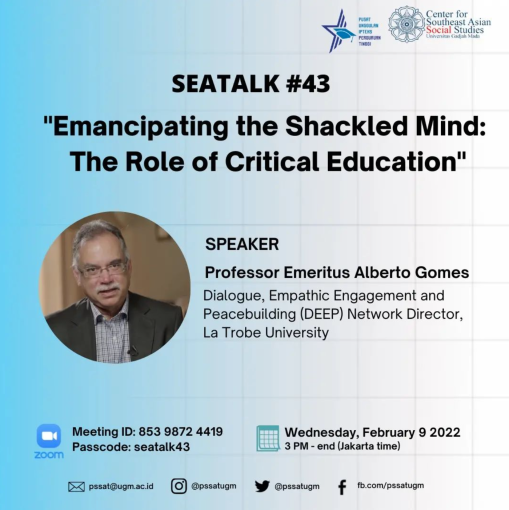
Education either functions as an instrument that is used to facilitate the integration of the younger generation into the logic of the present system and bring about conformity or it becomes the practice of freedom, how men and women deal critically and creatively with reality and discover how to participate in the transformation of their world. Said Prof. Alberto Gomes referencing Virilio’s ideas about critical pedagogy in South America, especially in the practice of Brazil education in SEA TALK Series #43, Prof. Alberto is a founding director of dialogue, emphatic, engagement, and peacebuilding at DEEP network and a professor at Emeritus La Trobe University in Melbourne Australia. In this SEA chat discussion, this time Prof. Alberto brings a discussion on the topic of emancipating the shackled mind and “the role of critical education”.
Key note speaker Prof Alberto Gomes – “Knowledge discourse and its dynamic bring a reflection about The role that we had as critical educators is to go back to look at giants educators from our local institution knowledge, from the history as the main source of our critical knowledge.”
This series of discussions brings up the importance of critical education, especially in higher education practices. Prof. Alberto found that there is an eighth core value of critical education – pedagogy. First of all, critical education have a role in regenerating traditional local intellectual institutions, second is critical education must unblock cognitive blockage, third is critical education see’s that there is another or alternative form of knowledge and follow by fourth that critical education is produced and create new critical nouns and spaces and followed by fifth that critical education is exorcising the ghostly relation between theory and practice, and for the sixth, eight and nine critical education promote indigenizing pedagogies with the focus to ecologist knowledge and empathic education.
Referencing the Bell quotes, Prof. Alberto said that the academy is not a paradise, but learning is a place where paradise can be created. The classroom with all its limitation remains a location of possibility. In that field of possibility, we have the opportunity to labor for freedoms, to demand of ourselves and our comrades, an openness of mind and heart that allows us to face reality even as we collectively imagine ways to move beyond boundaries, to transgress. This education is the practice of freedom. Followed by Pramoedya’s quotes that An educated person must learn to act justly, beginning, first of all, with his thoughts then later in his deeds. That is what it means to be educated. Talk listen, learn, reflect, critique, and dialogue, but most importantly, you must act based on this knowledge and understanding to make this a better world, where people live in peace with one another and with the nature.
Knowledge discourse and its dynamic bring a reflection about the role that we had as critical educators is to go back to look at giants educators from our local institution knowledge, from the history as the main source of our critical knowledge. There is not enough attention and recognition to who has impacted our public intellectual discourse.
So, we must rise the question of where our public intellectuals are in our universe in our university in our neo-liberalisation world?, sadly this reality is far from our present education so it is our responsibility to lift the spirits of decolonization and critical thinking in our way of thinking and knowledge.
